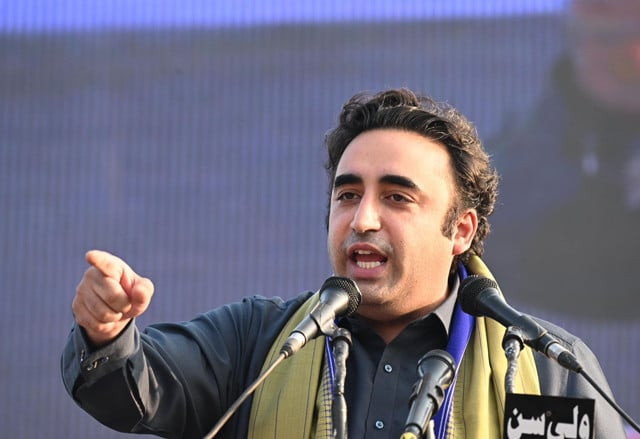Bilawal credits Isa for 26th Amendment
PPP chief warns against attempts to create controversies

Bilawal Bhutto Zardari said on Thursday that the 26th Constitutional Amendment would not have been possible if Qazi Faez Isa was not the chief justice, and warned that certain lobbies were creating controversies by linking the issue of 'black snake' with the military courts.
In an interview with BBC, the Pakistan Peoples Party (PPP) chairman said that the Pakistan Tehreek-e-Insaf (PTI) founder brought back the trend of political vendetta, and if this cycle of revenge had to be broken, the first step would have to be taken by the person who was in jail.
Bilawal claimed that the ruling Pakistan Muslim League-Nawaz (PML-N) had desired to incorporate changes in Article 8 of the Constitution to include military check posts, outposts and military installations so that those who target these places, even civilians, could be tried in military courts.
The most politicized and controversial aspect of the 26th Constitutional Amendment was the use of the term "military court", Bilawal said. He added that those involved in drafting the amendment, along with media analysts and various lobbying groups, were actively making the process contentious.
He cited a statement of Jamiat Ulema-e-Islam chief Maulana Fazlur Rehman, that "we have defanged the black snake", saying that in the name of black snake, an attempt was made to make this whole process controversial.
Bilawal explained that on May 9, some people attacked the Corps Commander's House in Lahore and other military installations elsewhere and the government decided, right or wrong, that the attackers would be prosecuted under the Army Act and Article Eight of the Constitution.
He added that, in the meantime, the court issued a ruling that overturned a law in place since 1950. The court focused on the words "armed forces personnel" in Article 8, interpreting it to mean that only individuals who attack "personnel of the armed forces" would be tried under the Army Act.
Some people believed that the court gave this ruling to benefit a political party, Bilawal said, adding that his party's proposal was simplewhere "members of the armed forces" was written, it should be replaced by words "armed forces", which was made very controversial.
It was the government's wish that it should be applied retroactively and include the armed forces as well as military installations and military outposts, but "we objected to the checkpoints and so did Maulana Fazlur Rehman", Bilawal continued. "And this one word was made a black snake".
When asked about setting the October 25 deadline for the passage of the 26th Amendment, he explained that they had the opportunity to bring the amendment bill in the presence of Chief Justice Isa. Such a big work, he added, was not possible in the presence of any other chief justice.
He praised Chief Justice Isa, saying that he was the only one person in the judicial history of Pakistan, who was willing to obey parliament and follow the Constitution, even at the cost of his personal power. He added that Chief Justice Isa could withstand pressure from his fellow judges.
Bilawal sought to shun the impression that the 26th Constitutional Amendment was linked to any single person. He charged that the opponents of this amendment made "baseless allegations" on various occasions to make the whole process controversial.
When asked about bypassing Justice Mansoor Ali Shah in the appointment of the new chief justice, Bilawal said that he didn't know that Justice Shah would not become the chief justice. He stressed that it was not the party position before the Amendment.
When asked if the appointment of the chief justice had become political, he asserted that every political decision is inherently political. He emphasized that, globally, judges are appointed not by the judiciary itself, but by a parliamentary committee or the executive.
He repeated that every democratic decision was political and added that in Pakistan, politics had been branded as a curse deliberately. He said that dictatorship and the establishment had constantly been trying to make people think that way.
He said that Justice Shah was a very respectable person and he would obey the Constitution and the law and would not become any obstacle in this matter. As far as the incoming chief justice Yahya Afridi was concerned, Bilawal said that there were no allegations against him.
Addressing allegations of buying, threatening and even kidnapping lawmakers to secure their votes for the Amendment, the PPP chairman insisted that he had already completed the numbers for the passage of the Amendment but he still wanted to bring Maulana Fazl on board.
When asked specifically, whether he faced any pressure or phone calls from the military establishment or the PML-N to end the talks with Fazl, he responded by saying that he could not say anything on this. He added that he did not want a "forced vote" to fulfil the promise made in the Charter of Democracy.
When asked if he still considered a success when his party backed away from its biggest demand in this amendment, the establishment of the constitutional court, and settled instead for the constitutional benches, he quoted William Shakespeare: "A rose, by any other name, would smell as sweet".
He insisted that the constitutional benches, to be formed under the 26th Amendment, would have the same powers that he wanted to introduce in the form of a constitutional court. He added that portraying the constitutional benches as a big compromise was a misunderstanding.
The constitutional benches would be constituted to interpret the Constitution and matters related to the Constitution. The number of these benches and their tenure would be decided by the Supreme Judicial Commission (SJC) and all provinces would have equal representation in them.
He said the critics of the amendment are the same people who also criticised the 18th Amendment. He added that they were same who had "told us that the state will be like mother" and "forced us" to the 19th Amendment, he added.
He rejected the allegations from his opponent that the PPP made this amendment at the behest of the establishment so that PTI founder Imran Khan could not get relief. He said he had implemented the Charter of Democracy, not at the behest of the establishment but at the behest of his mother.
About the allegations of political and personal vendetta against the PTI founder, Bilawal emphasised that the PPP had ended the cycle of political revenge but Imran Khan Niazi brought it again, adding that today he was enduring what he did.
He said that if this cycle of political revenge had to end then Imran would have to end it but they were not in the mood to do so. "I say that democracy is the best revenge. I do not believe in any political prisoners. I ask them to break this cycle. But the first step will have to be taken by the man, sitting in jail."



















COMMENTS
Comments are moderated and generally will be posted if they are on-topic and not abusive.
For more information, please see our Comments FAQ